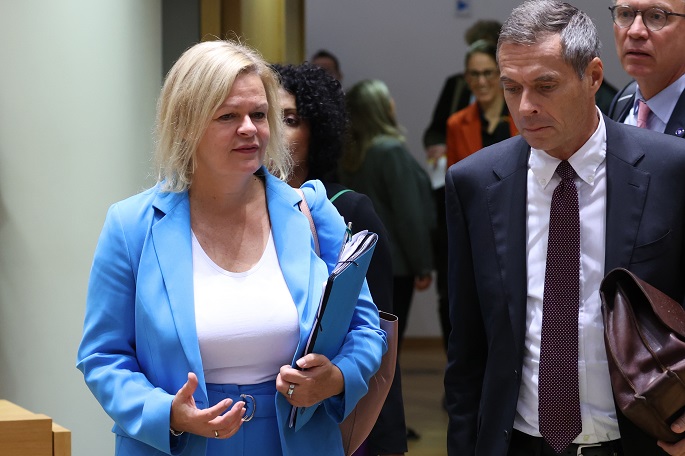Germany to pave way for controversial part of EU asylum reform
Published : 29 Sep 2023, 00:09
Berlin is ready to agree to a new compromise proposal for how to regulate migration to the European Union in times of crisis, German Interior Minister Nancy Faeser said in Brussels on Thursday.
The controversial measures are a sticking point in a sweeping migration reform, aiming to limit migration to the bloc, that has been in the works for years. Germany had rejected a previous proposal.
Faeser told her EU counterparts that Berlin is now willing to vote in favour of the compromise, despite lingering concerns.
Germany has repeatedly called for better protection of families under the crisis provision.
"We're going to continue to push for this," Faeser said, addressing fellow EU ministers.
Luxembourg's Immigration Minister Jean Asselborn said his country backs Berlin's call for better protection for families together with Ireland and Portugal.
Faeser regretted however that there was no "broad majority" among EU states for this.
The crisis regulation would apply in the event of a particularly large influx of migrants to the EU.
Arriving at the meeting earlier, Faeser called for a strict mechanism on how an EU state can declare a crisis and trigger the special rules.
The provision provides for longer deadlines for the registration of asylum applications at the EU's external borders, as well as the possibility of lowering standards for accommodation and care.
Additionally asylum seekers could be obliged to stay in reception facilities near the border for longer than 12 weeks.
Germany's main argument for not agreeing to a previous proposal for the crisis regulation were concerns that the standards for asylum seekers would be lowered too much.
The emergency rules could also lead EU countries where migrants first arrive to allow more to travel onward to Germany and other countries in the EU's more prosperous north, prompting additional criticism in Berlin.
Migration hardliners Poland and Hungary, on the other hand, previously said the proposal does not go far enough.
Once a sufficient majority of EU states has formally backed a common position - a situation that may now be closer in light of the change in Germany's position - talks with the European Parliament on the details of the legislation are to start.
Work on the migration and asylum reform package has become a race against time.
Negotiations on draft bills between EU countries and the European Parliament which are not concluded ahead of next year's European elections could have to start afresh with newly elected lawmakers or face long delays.
In the case of the asylum reform, this would be a particularly big setback as the legislation has been in the works for years.
After fewer arrivals during the Covid-19 pandemic, the number of migrants coming to the EU has risen sharply in recent months, exposing unresolved rifts between the bloc's 27 member states.
Another migration issue on the table was a controversial agreement between Brussels and Tunis that partly aims to reduce the number of migrants crossing the Mediterranean towards Italy.
The deal, struck in July, has been criticized for being signed amid allegations of rights violations by the Tunisian government as well as for having had little impact so far on the actual number of arrivals in Italy.
Less contentious was the prolongation of an exemption for Ukrainian refugees who are allowed to stay in the EU without having to apply for asylum. EU ministers were expected to extend the waiver until March 2025.
The only other topic besides migration on the agenda was the fight against drug trafficking from Latin America to the EU, which was to be discussed with representatives from the region.


